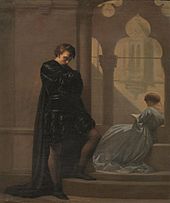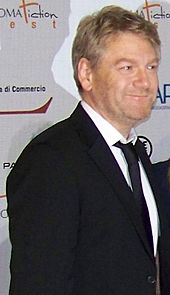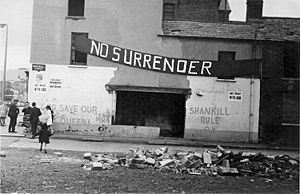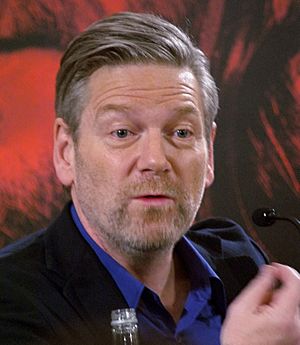Kenneth Branagh facts for kids
Quick facts for kids
Kenneth Branagh
|
|
|---|---|
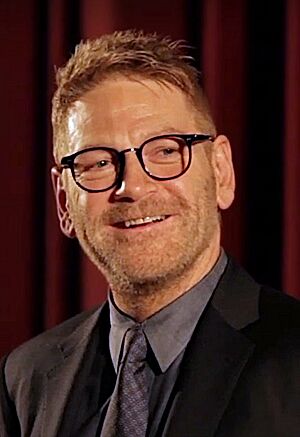
Branagh at diff 2015
|
|
| Born |
Kenneth Charles Branagh
10 December 1960 Belfast, Northern Ireland
|
| Occupation |
|
| Years active | 1981–present |
|
Works
|
Filmography |
| Spouse(s) |
|
| Partner(s) | Helena Bonham Carter (1994–1999) |
| Awards | Full list |
Sir Kenneth Branagh (born in 1960) is a famous British actor and filmmaker. He was born in Belfast, Northern Ireland, and grew up mostly in Reading, England. Kenneth Branagh studied acting at the Royal Academy of Dramatic Art (RADA) in London. He was even the president of RADA from 2015 to 2024.
Branagh has won many important awards for his work. These include an Academy Award, four BAFTA awards, two Emmy Awards, a Golden Globe Award, and an Olivier Award. He was made a Knight in 2012, which means he can be called "Sir." In 2018, he was given the Freedom of the City in his hometown of Belfast. In 2020, The Irish Times newspaper listed him as one of Ireland's greatest film actors.
Kenneth Branagh is well-known for directing and starring in movies based on plays by William Shakespeare. Some of these films include Henry V (1989), Much Ado About Nothing (1993), and Hamlet (1996). He was nominated for Academy Awards for his work on Henry V and Hamlet. He also directed the short film Swan Song (1992), which was nominated for an Academy Award.
Besides Shakespeare, Branagh has directed other popular movies. These include Thor (2011) and Cinderella (2015). His film Belfast (2021), which was about his own childhood, won him an Academy Award for Best Original Screenplay. He was also nominated for Best Picture and Best Director for Belfast.
Branagh has also played the detective Hercule Poirot in a series of movies, starting in 2017. He has acted in many other films too, like Harry Potter and the Chamber of Secrets (2002), where he played Professor Gilderoy Lockhart. He also appeared in Christopher Nolan's films Dunkirk (2017), Tenet (2020), and Oppenheimer (2023).
On television, Branagh starred in the series Wallander from 2008 to 2016. He won an Emmy Award for his role as Reinhard Heydrich in the HBO film Conspiracy (2001).
Contents
Early Life and Education
Kenneth Charles Branagh was born in Belfast on December 10, 1960. His parents, Frances and William Branagh, were working-class Protestants. His father was a plumber and carpenter. Kenneth was the middle of three children and lived in the Tigers Bay area of Belfast.
In 1970, when he was nine, his family moved to England to escape the conflict known as The Troubles. They settled in Reading, Berkshire. Branagh went to Whiteknights Primary School and Meadway School there. He acted in school plays like Toad of Toad Hall.
At school, Branagh learned to speak with a standard English accent to avoid being bullied. He later said he still felt Irish and that Belfast was a big part of who he was. He loved words, which he also linked to his Irish background. He was a keen member of the Progress Theatre, where he is now a patron. After finishing school, he trained at the Royal Academy of Dramatic Art (RADA) in London. In 1980, the head of RADA asked Branagh to perform a speech from Hamlet for Queen Elizabeth II.
A Rising Star
Early Career and Stage Success
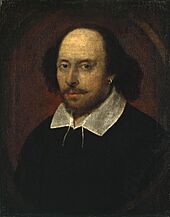
Branagh's first small film role was in Chariots of Fire (1981). He became well-known in Northern Ireland for playing Billy in the BBC's Billy Plays (1982–84). These plays were set in Belfast. In the UK, he gained fame for his stage acting. He won an award in 1982 for Best Newcomer for his role in Another Country.
In 1984, he appeared in the Royal Shakespeare Company's production of Henry V. This play was very popular and sold out. Branagh later adapted this production into his 1989 film version. In 1987, he and David Parfitt started the Renaissance Theatre Company. They had success with plays in London, including Branagh's production of Romeo and Juliet.
Their first big Renaissance production was Twelfth Night in 1987. It starred Richard Briers and Frances Barber. The music was composed by Patrick Doyle, who later worked on Branagh's film Henry V. This play was also made into a TV show. Branagh also wrote a play called Public Enemy, set in Belfast. In 1987, he got his first main film role in A Month in The Country. He played an ex-army officer looking for Saxon treasures.
In 1988, Renaissance Theatre Company toured with three Shakespeare plays. These included Much Ado About Nothing, directed by Judi Dench, and As You Like It. Derek Jacobi directed Branagh in the main role of Hamlet. Critics praised Branagh's energy and passion in these roles.
Becoming a Major Filmmaker
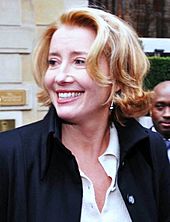
In 1989, Branagh acted with Emma Thompson in the play Look Back in Anger. Judi Dench directed both the play and its TV version. In 1990, he wrote his autobiography, Beginning. He said he wrote it mainly for the money, which helped his company.
Branagh directed and starred in the thriller Dead Again (1991) with Emma Thompson. The film was well-received. The next year, he directed the comedy-drama Peter's Friends. This film starred many of his friends from acting school, including Emma Thompson and Hugh Laurie. Critics liked it, comparing it to the American film The Big Chill.
He continued his Shakespeare film adaptations with Much Ado About Nothing (1993). This film featured a famous cast, including Denzel Washington and Keanu Reeves. Critics praised Branagh's direction, saying he made the romantic comedy feel "emotionally alive."
However, his horror film Mary Shelley's Frankenstein (1994) was not as successful. It starred Branagh and Robert De Niro. Critics gave it negative reviews. He then directed the romantic comedy In the Bleak Midwinter (1995), which received positive reviews.
In 1995, Branagh played Iago in Othello, acting opposite Laurence Fishburne. His performance was highly praised and earned him an award nomination.
Branagh then directed and starred in the acclaimed film Hamlet (1996). This film is known for its grand scale and long running time (four hours). It featured a large cast, including Kate Winslet and Derek Jacobi. Many critics consider it one of the best film versions of Hamlet. The film received four Academy Award nominations.
After Hamlet, Branagh focused more on acting in films directed by others. He appeared in Celebrity (1998) and the Western film Wild Wild West (1999). During this time, he also did voice work for radio plays and audiobooks, like The Magician's Nephew by C. S. Lewis. He narrated several BBC documentaries, including Walking with Dinosaurs.
Established Director and Actor
2000s: New Roles and Directing
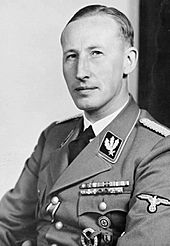
Branagh's film Love's Labour's Lost (2000) was not a success, which paused his directing for a bit. That same year, he voiced Miguel in the animated film The Road to El Dorado. In 2001, he acted in the HBO film Conspiracy, playing Reinhard Heydrich, a Nazi official. He won an Emmy Award for this powerful performance.
In 2002, Branagh played Professor Gilderoy Lockhart in Harry Potter and the Chamber of Secrets. He also played Sir Ernest Shackleton in the TV film Shackleton, which earned him award nominations. In 2003, he directed a Broadway play called The Play What I Wrote.
Branagh has been in several TV films. He played US President Franklin D. Roosevelt in Warm Springs (2005), earning another Emmy nomination. In 2006, he directed a film version of As You Like It and an opera film, The Magic Flute. He also directed the thriller Sleuth (2007).
Branagh starred as Inspector Kurt Wallander in the English TV series Wallander, based on crime novels. The first series aired in 2008. He won an award for best actor for this role in 2009. He also won a BAFTA TV award for Best Drama Series. The series continued until 2016.
From 2008 to 2009, Branagh starred in the play Ivanov in London. His performance was highly praised by critics.
2010s: Blockbusters and Biopics
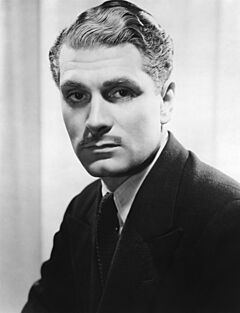
In 2011, Branagh directed Thor, a movie about the Marvel Comics superhero. This film was a big success. That same year, he played the famous actor Laurence Olivier in My Week with Marilyn (2011). Critics loved his performance, and he was nominated for an Academy Award for Best Supporting Actor.
Branagh took part in the 2012 Summer Olympics opening ceremony in London. He played Isambard Kingdom Brunel and performed a speech from Shakespeare's The Tempest. In 2013, he co-directed and starred in Macbeth at the Manchester International Festival. This sold-out show was even broadcast to cinemas. He repeated this role in New York City in 2014.
In 2015, Branagh started his own theater company, the Kenneth Branagh Theatre Company. He presented five shows in London, including The Winter's Tale and Romeo and Juliet. He acted in some of these plays and directed most of them. Famous actors like Judi Dench and Derek Jacobi also joined his company.
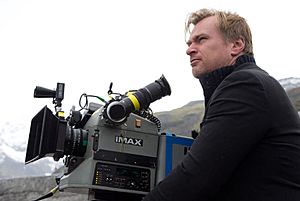
In 2014, Branagh directed and acted in the action film Jack Ryan: Shadow Recruit. The next year, he directed Disney's live-action movie Cinderella (2015), which was a big success.
In 2017, Branagh worked with director Christopher Nolan for the first time in the World War II film Dunkirk. He played a Royal Navy Commander. That same year, Branagh directed and starred as Hercule Poirot in Murder on the Orient Express, based on the Agatha Christie novel.
In 2018, he directed and starred in All Is True, playing William Shakespeare. He also directed the fantasy adventure film Artemis Fowl, released in 2020. In 2019, Branagh was cast in Christopher Nolan's film Tenet (2020), where he played the villain Andrei Sator.
2021–Present: Recent Work
In 2021, Branagh directed the film Belfast, which was inspired by his own childhood in Northern Ireland during a time of conflict. The film was shot in black-and-white and received great reviews. It won the People's Choice Award at the Toronto International Film Festival. Belfast received seven Academy Award nominations, and Branagh won for Best Original Screenplay. He also won a BAFTA Award for Outstanding British Film.
He returned as Hercule Poirot in Death on the Nile (2022), which he also directed. In 2022, it was announced that Branagh would direct and star in a third Poirot film, A Haunting in Venice, based on Christie's Hallowe'en Party.
Branagh reunited with Christopher Nolan again, playing the physicist Niels Bohr in the film Oppenheimer (2023). That same year, Branagh returned to the stage in London, directing and starring as King Lear in a play by William Shakespeare. This production is set to move to New York City in the fall of 2024. In May 2024, it was announced that Branagh would write and direct a new film called The Last Disturbance of Madeline Hynde. In June 2025, it was reported that Branagh will play a role in a sequel to the 2006 film The Devil Wears Prada, which is expected in 2026.
Personal Life
From 1989 to 1995, Kenneth Branagh was married to English actress Emma Thompson. They appeared together in several films and plays, including Henry V and Much Ado About Nothing.
After their marriage ended, he was in a relationship with his co-star Helena Bonham Carter until 1999. In 2003, he married film art director Lindsay Brunnock, whom he met while filming Shackleton in 2002.
Branagh has said that he feels Irish. He also mentioned that he became "much more religious" after listening to Laurence Olivier read the Bible every morning while preparing for his role as Olivier in My Week with Marilyn.
Filmography
| Year | Title | Distributor |
|---|---|---|
| 1989 | Henry V | The Samuel Goldwyn Company |
| 1991 | Dead Again | Paramount Pictures |
| 1992 | Peter's Friends | The Samuel Goldwyn Company |
| 1993 | Much Ado About Nothing | |
| 1994 | Mary Shelley's Frankenstein | TriStar Pictures |
| 1995 | In the Bleak Midwinter | Sony Pictures Classics |
| 1996 | Hamlet | Sony Pictures Releasing |
| 2000 | Love's Labour's Lost | Pathé / Miramax |
| 2006 | As You Like It | HBO Films / Lionsgate Films |
| The Magic Flute | Revolver Entertainment / Les Films du Losange | |
| 2007 | Sleuth | Sony Pictures Classics |
| 2011 | Thor | Paramount Pictures |
| 2014 | Jack Ryan: Shadow Recruit | |
| 2015 | Cinderella | Walt Disney Studios Motion Pictures |
| 2017 | Murder on the Orient Express | 20th Century Fox |
| 2018 | All Is True | Sony Pictures Classics |
| 2020 | Artemis Fowl | Disney+ |
| 2021 | Belfast | Focus Features |
| 2022 | Death on the Nile | 20th Century Studios |
| 2023 | A Haunting in Venice | |
| TBA | The Last Disturbance of Madeline Hynde | TBA |
Awards and Honors
Kenneth Branagh has been nominated for eight Academy Awards. He is the first person to be nominated in seven different categories! His first two nominations were for Henry V (for directing and acting). He also received similar BAFTA Award nominations. His first BAFTA TV award was in 2009 for Best Drama Series (Wallander). He received other Academy Award nominations for the short film Swan Song (1992) and for writing the screenplay of Hamlet (1996). His fifth nomination was for playing Laurence Olivier in My Week With Marilyn in 2012.
In 2022, he received three more nominations for Belfast – for Original Screenplay and Best Picture. He won the Academy Award for Original Screenplay. This made him the first person to be nominated in seven different Academy Award categories.
He is an Honorary President of NICVA (Northern Ireland Council for Voluntary Action). He received an honorary degree from Queen's University of Belfast in 1990. He is also a supporter of the charity Over The Wall. He has served on the Board of Governors of the British Film Institute. In 2000, Branagh was the youngest actor to receive the Golden Quill award. In 2001, he received another honorary degree from the Shakespeare Institute at The University of Birmingham.
On July 10, 2009, Branagh received the Lifetime Achievement Award at the RomaFictionFest. He was also listed on the Radio Times's TV 100 power list in 2023.
He was made a Knight in 2012 for his contributions to drama and the community in Northern Ireland. He received this honor at Buckingham Palace on November 9, 2012. He said he felt "humble, elated, and incredibly lucky" to be knighted.
In October 2015, Branagh became the new President of the Royal Academy of Dramatic Art (RADA). He took over from the late Richard, Lord Attenborough. As President of RADA, he was listed among the most influential people in the UK in 2017. In October 2017, he was given the Freedom of the City of Belfast. This honor was officially given to him on January 30, 2018. He also received the Freedom of the Town of Stratford-upon-Avon on April 22, 2022. Branagh stepped down as president of RADA in February 2024.
Images for kids
See also
 In Spanish: Kenneth Branagh para niños
In Spanish: Kenneth Branagh para niños
 | Mary Eliza Mahoney |
 | Susie King Taylor |
 | Ida Gray |
 | Eliza Ann Grier |


